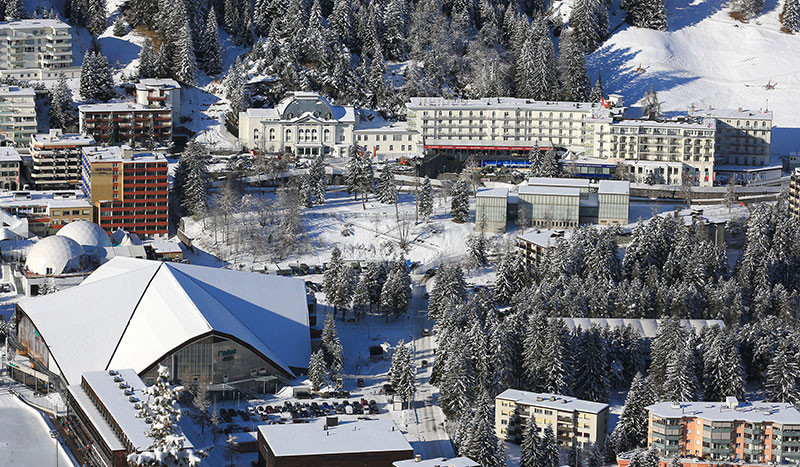#WeMeanIt Daily Dispatch: January 22
We Mean Business
SIGN UP to receive the #WeMeanIt Daily Dispatch >
Climate and energy stories direct from Davos.
The World Economic Forum Annual Meeting is now in full swing. And all around Davos today we‘ve been hearing a clear and consistent message: business has a critical role in helping to meet the climate challenge – and it’s ready to play its part.
But there’s something else: we’re also sensing a real shift. Yes, business leaders cite risk as a reason to take action. Climate change is already impacting companies and presents a major drag to their bottom lines. But business leaders are now seeing the opportunity taking bold action on climate offers. More companies than ever before are making smart, low carbon investments – and reaping the financial benefits of doing so.
The Climate Has Changed report demonstrates that forward-thinking companies that have invested in low-carbon programs are reporting a 27% internal rate of return on average for the years 2012-2013. More business leaders and investors are committed to bold leadership on climate action than at any time in history.
And the conversation on climate and energy in Davos has shifted from one of financial risk to economic opportunity.
WHAT’S HAPPENING TODAY
- Integrating Climate Risks into Financial Systems (World Economic Forum)
- Planetary Boundaries: Blueprint for Managing Systemic Global Risk (World Economic Forum)
- Closing the Climate Deal (World Economic Forum)
- Leading the Climate Charge (World Economic Forum)
- The Energy-Climate Nexus (World Economic Forum)
- The New Communications Context: Communicating the Climate and Development Message (World Economic Forum)
INDIA’S OPPORTUNITY
Shifting from subsidies to market-driven energy pricing could revolutionize India’s climate and energy future, according to the CEOs at a roundtable hosted by We Mean Business and the Confederation of Indian Industry. For many of India’s 1 billion citizens, electricity and fuel is either free or highly subsidized, if and when they can access it. But the opposite is the case for India’s biggest companies, who pay the true cost of energy and in effect shoulder the cost of inefficiencies in the system. In the absence of government action on redressing the negative impact of energy subsidies and distribution losses, Indian CEOs are acting, targeting 5% reduction of energy use per year (through better efficiency) over the next five years. Some of the CEOs at the roundtable had already achieved 25% reductions in energy costs per unit of product. For more on the energy efficiency opportunity in India, look for our India briefing paper.
FACEBOOK’S OPEN SOURCE ENERGY FOOTPRINT
Bumping into Sheryl Sandberg, at Davos reminded us that you can find more than friends on Facebook. They have been open sourcing a lot of their energy use and footprint data. As they say, they are excited about sharing their data and hope that others will do the same. Beyond reporting – they are serious about energy efficiency and renewables to drive down their costs… Like?
LIVE EARTH
Al Gore gave another trademark presentation on the realities of climate change – as well as the realities of the response: “We have the solutions at hand. And this is why I’m so excited about all of the work being done, led by the business community,” he said. “The private sector is leading the way,” he added, stressing that almost two-thirds of investment in clean energy comes from the private sector. To further demonstrate to governments and businesses the vast body of global citizenry who stands behind a coordinated response to climate change, he announced with singer Pharrell Williams and producer Kevin Wall the seven-continent (yes, including Antarctica) Live Earth event this coming June.
CARBON PRICING
Carbon pricing was a popular topic today at Davos, with several business leaders from developed and emerging markets, as well as economists and climate experts, talking about its importance. Need a primer on the state of the state when it comes to carbon pricing? Check out the World Bank’s microsite.
IN THE NEWS
- “Davos 2015: climate change makes a comeback,”
The Guardian - “Al Jazeera’s Ali Velshi: Climate Change Awareness Now ‘Intergenerational’,”
Huffington Post - “Pharrell, Al Gore Bringing Back Live Earth in 2015,”
Rolling Stone
QUOTES FROM THE DAY
“And no challenge – no challenge – poses a greater threat to future generations than climate change.”
– US President Barack Obama
“It is not surprising that more businesses are stepping up to the plate. We now have 4,000 businesses reporting their greenhouse gas emissions; 80% of the world’s 500 largest companies are now setting target emissions standards; 50 of the top-200 companies now have an internal price for carbon. … In New York, we had 1,000 businesses who signed a statement calling for a price on carbon.”
– Paul Polman, CEO of Unilever
“Indian business is focused and concerned about climate and energy efficiency. One of the major factors is that Indian businesses today pay the most for energy in India. Energy efficiency is a very important part of reducing their variable costs.”
– Dr. Pankaj Agarwal, CEO, PRM Power
“Those of us who think that market economies work well, are also those who think when we see a major failure like this that the right thing to do to get the markets to work well is to correct it. And there’s a very simple correction: it’s carbon pricing. It can raise revenues for all the important things we have to do, like enhancing the life of poor people, [and] investing in innovation, health and education.”
– Lord Nicholas Stern, climate economist
“There is no solution for climate without business, but equally there is no business continuity without a solution to climate.”
– Christiana Figueres, Executive Secretary of the United Nations Framework Convention on Climate Change


